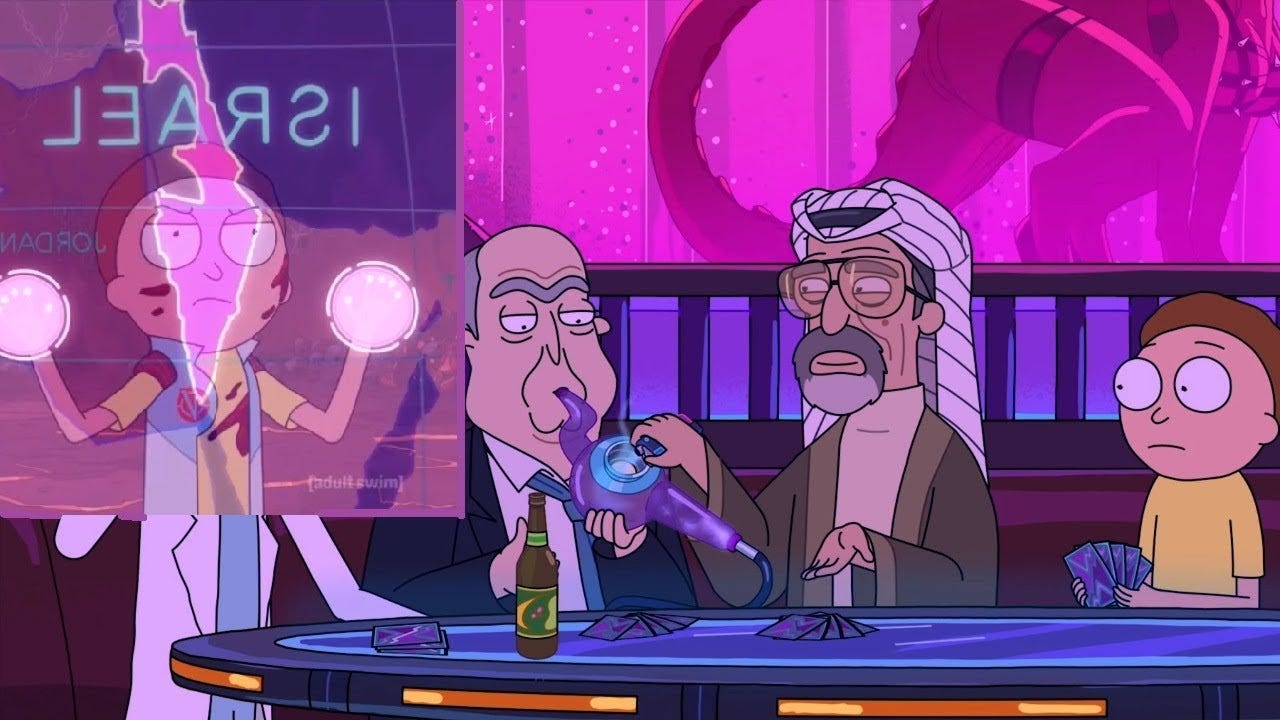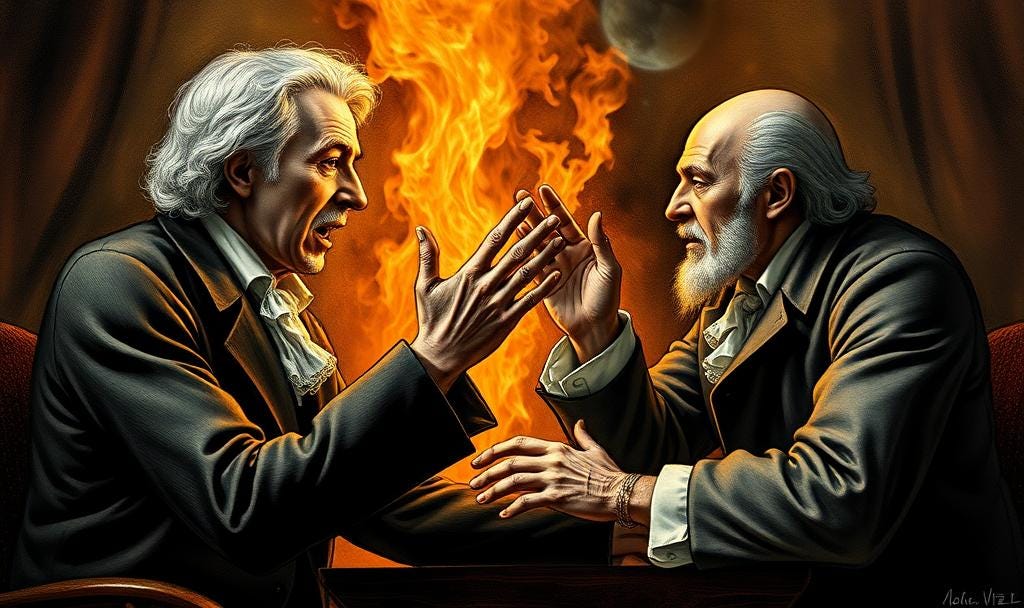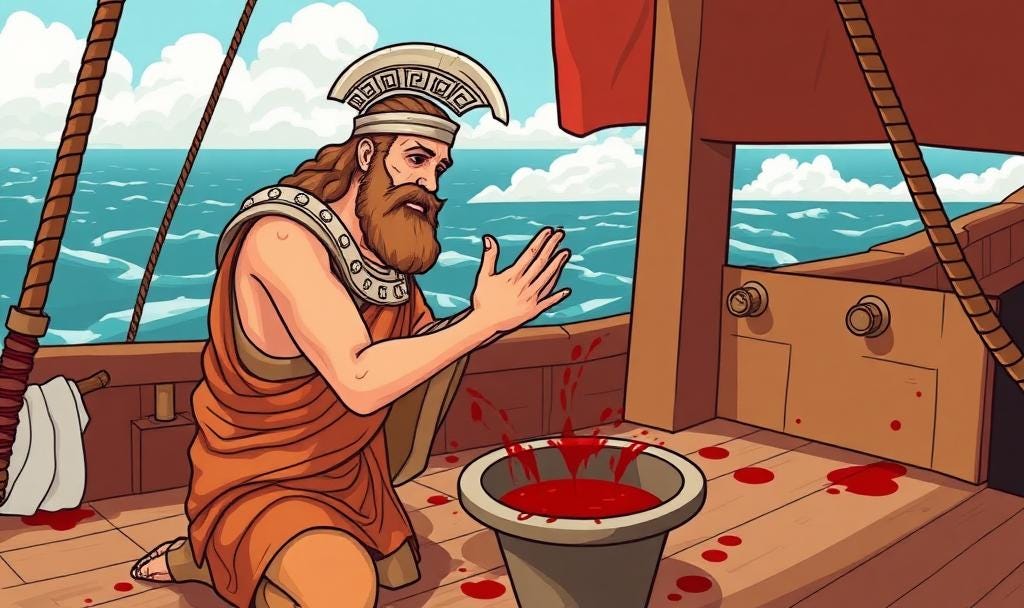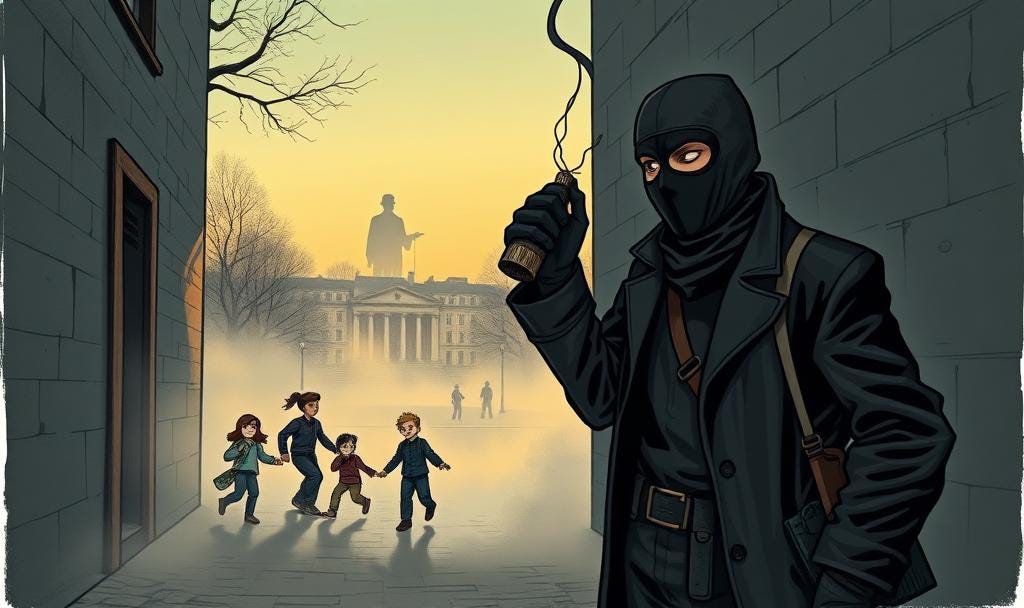Navigating the Moral Maze
The Hamas-Israeli Conflict and Dirty Hands
This article was originally written in January 2024 and revised in February 2025.
500 days have passed since the Hamas attacks on October 7, 2023, and in the constant fury of opinions, hot takes, arguments, shared news clips, outrage and condemnation, I’ve been struggling to make sense of what’s happening and how I should think and feel about it.
This became even more difficult after the Israeli “countermeasures”: more and more people shared their takes and I felt very acutely that even though I am having visceral reactions to various things, these emotions and thoughts don’t really coalesce into a coherent whole. This article is my effort to grapple with the issue and stitch together… an argument? A view? A take! I know, super specific. I hope that by putting them into writing, my thoughts become clearer and therefore, even if by a tiny step, I may get closer to an approximation of the truth. Now let’s get into it.
In my view, there are three ideas that are fundamental in trying to build a coherent argument about this issue. Let’s call them the three pillars, on which my argument will be constructed.
First, the question of Israel (for practicing anti-Semites: the Jewish Question) is one of the most complex puzzles of the international order. There is a reason why this question became the epitome of an unsolvable dilemma – it’s a fucking Gordian knot of monumental proportions and not acknowledging this seems flat-out nonsensical. Hell, there’s even been a Rick and Morty bit making fun of everyone’s efforts to ‘solve’ the Middle East. So, I propose that we go into what follows with an open mind, seeing whether we can at least make some sense of what’s going on here.
Okay so we know that we have a complex situation. Second thesis: there are multiple interest groups among both Israelis and Palestinians. Not every Jewish citizen (or someone who is of Jewish faith) is an avowed Zionist, not every Palestinian is a Hamas-sympathizer. These intergroup rivalries played out in the past and will continue to exist – this also means that there is no natural path that any of this “had” to take. There were and continue to be various alternative routes that specific groups opted to take or not to take. Recognizing this helps us avoid the pitfalls of historical determinism and retroactively projecting our current knowledge into actions in the past.
Third thesis – the decisions are made by people who believe themselves to be rational, who consider a number of alternatives and choose what seems “best” in any given moment. This addresses the fundamental contradiction: inhuman acts are being committed, they are mind-boggling and absolutely terrifying … and yet somehow they keep happening. If we dismiss the people engaging in such acts as evil incarnate, we will not understand what drove them to do this, and what’s more, what drove them to understand their actions as permissible, necessary, and I’m going to go out on a limb here, even virtuous. Accepting this as a foundation helps us avoid depicting any side as “irrational” or “crazy”.
Okay so to sum up, we start this operation with three main tools: complexity of the situation; plurality among actors; rationality of participants.
Now, let’s start dissecting the moral aspects of the conflict with literature and philosophy. As we journey from ancient Greece to 20th century France, please keep the above three theses in mind.
Part 1 - Would You Kill Your Own Daughter, if a God Told You So?
Martha Nussbaum, a philosopher writing about the “fragility of goodness”, discusses the tragedy of Agamemnon, the Greek king who is about to set off to Troy on a mission mandated by the gods – get back the wife of his brother, who was ‘abducted’. He gathers an army, moves to the shore, assembles his ships and is about to set off but curses, there is no wind! The ships don’t move an inch, the army is stranded. Soon, their provisions start to run out, illness begins to eat away at them – it is clear that if they don’t leave soon, they will be unable to pursue their war (side note: consider that this is ancient Greece, so a god-mandated war is essentially as morally virtuous as it gets – if you want, replace it with “a quest to save starving puppies”). Agamemnon asks an oracle – as one does – what to do. After sacrificing a couple of animals and digging around in their intestines, a most unpleasant answer is given: “sacrifice your daughter, Iphigenia, and you shall get your wind”. Now Iphigenia is a good lass and what’s more, Agamemnon is a good father – he loves his daughter! Which route will he pick? We will pick up the story later but for now, the important point is this: there are situations in which multiple duties clash and there is no good choice – at least, the Greeks thought so.
Just imagine: you have a duty put upon you by the gods to pursue your war (1) and, on the other hand, you have a duty put upon you by the gods to not sacrifice your child (2). In the moral universe of the ancient Greeks, it was entirely commonplace to have moral duties that are entirely incompatible. You have a duty to bury your brother but also a duty to follow the orders of the king? Tough luck Antigone. You have a duty to revenge your father but also not to kill your mother (who killed your father)? Better luck next time, Elektra. Sometimes life just puts you in a position, where you’re damned if you do and damned if you don’t.
This understanding is far less pronounced in the Christian or in the post-Christian period. Clearly for Christians, just do what Jesus would do, and you’re golden. As for post-Enlightenment (this is us, rational, superior humanoids), think of the two main ways of understanding moral situations: consequentialism and deontology. Consequentialism claims, that whatever brings forth the better outcome is better, while deontologists concentrate on the act itself – if it’s a “morally bad” act, you should just refuse to do it.
There is no real place for a moral dilemma here. If you are a consequentialist, you suggest to Agamemnon to pop Iphigenia on the barbecue as soon as possible, then get on with the mission, saving the war and the lives of all your soldiers. If you’re Immanuel Kant (biggest deontology nerd of all time), then you’d be out with your hottest take and say that sacrificing your daughter is objectively bad in every situation. None of these approaches really capture how complex this situation is, unlike the Greeks. Now let’s accept this morally ambiguous, Hellenistic take on morality as we return – for a short bit – to the Israel-Hamas situation.
Reflecting on our original three pillars and Agamemnon’s story, we see that a complex moral situation can arise where there seems to be no 'good choice'." I’m going to massively simplify this but from what I see the duty Israeli leaders choose to focus on is (1) defending Israel and its Jewish population. This seems to be at odds with the duty of (2) avoiding the massacre of innocent people. Meanwhile the argument of the other side can be summed up as (1) the right to resist oppression – unfortunately, October 7 showed that this can easily trump (2) the duty of not massacring innocent people. There are a whole number of factors that even further complicate the moral landscape but even these mental scaffoldings should suffice to demonstrate that a simple consequentialist or deontological approach will not really suffice. Okay so we need a more nuanced approach to understand what the fuck is going on and how we should wrap our heads around it.
Okay let’s return to the story of Agamemnon, because it will help us better sink our teeth into the issues at hand. After a bit of head scratching, old Agamemnon decides that his duty as a king trumps his duty as a father, off he goes, daughter sacrificed, wind secured, war can begin, grand. He is, understandably, quite upset for a bit. But then, being the rationalizing animal that all humans are, he convinces himself that all is for the best, he takes a consequentialist approach.
‘And when he had put on the yoke-strap of compulsion,
his spirit’s wind veering to an impious blast,
impure, unholy, from that moment
his mind changed to a temper of utter ruthlessness.’
And this is the real gist of the whole thing, the most important reason why I dragged you through this long bit of Hellenistic tangent. As soon as Agamemnon convinces himself that there is no other way, he becomes blind of his other duty – his duty as a father. And the play of Sophocles quoted above points this out and implies that this swiftness with which he excuses his transgression will, eventually, come to bite him in the ass. In other words, if you commit a moral sin, your hands get dirty. Agamemnon was so good at rationalizing and telling himself that just because he was compelled to do one thing, it also rendered it morally okay. Do you see where I’m going with this?
Recognizing that a complex moral framework involves difficult decisions, each with corresponding rewards or punishments, is essential to understanding what 'the crack' really is. Now a man who was very much into trying to understand what “the crack” is is French existential Jean-Paul Sartre, who will help us dig a bit deeper into this question of moral punishment.
Part 2: Dirty Hands in Political Decision-Making - Sartre's Perspective:
Transitioning into the realm of political leadership, we’ll look at the man with the most crooked of smiles, Jean-Paul Sartre and his discussion of ‘dirty hands". In short, leaders, who faced with the exigencies of political reality, grapple with situations where moral principles and desired outcomes are often in conflict.
"Dirty Hands," a play by Sartre, centers around Hugo Barine, a young communist revolutionary entangled in the Spanish Civil War's political and moral complexities. Barine is tasked with assassinating Hoederer, a fellow communist leader, as part of a political maneuver orchestrated by his party. The crux of the drama lies in the moral dilemma that Hoederer represents—balancing ideological purity with pragmatic political action. Hoederer advocates for compromising ideals to achieve tangible results in the pursuit of political power. In a crucial scene, Hoederer lambasts the idealist Barine who confronts the notion of getting "dirty hands”.
"You cling so tightly to your purity, my lad! How terrified you are of sullying your hands. Well, go ahead then, stay pure! What good will it do, and why even bother coming here among us? Purity is a concept of fakirs and friars. But you, the intellectuals, the bourgeois anarchists, you invoke purity as your rationalization for doing nothing. Do nothing, don’t move, wrap your arms tight around your body, put on your gloves."
This quote perfectly captures Hoederer's critique of those who, in his view, use their desire for purity as an excuse for inaction and avoidance of the complex, messy realities of political engagement. This is, in effect, is a consequentialist argument. One must get their hands dirty now for a future, where no one has to get their hands dirty. There is a rich history of this mode of rationalizing (sadly no real space here to explore it), but one can think of Judas taking on the role of the betrayer so that Jesus can save everyone. But Agamemnon’s story flips the script on this whole rationalising business. Tread carefully, because if you rush to give yourself a sweet excuse out of your moral dilemma, well, that’s not a very good look buddy.
The real issue, and the point of this section, emerges when one encounters a cause so great that really any action, no matter how questionable, begins to feel like a small compromise for the “greater good”. Salvation for mankind? World communism? Survival of the state? Freedom for our people? How many children would you be ready to kill now if that meant that no child would die of malaria in the next 20 years?
This was precisely the question that confronted early communist revolutionaries. They thought that they are bringing about a world without class, a world without oppression – essentially paradise on earth. What is a price that is acceptable for that? Amazingly, philosophy’s ultimate trouble-maker-heart-breaker-goal-stopper-smoking-(hot)-bad-boy Albert Camus explored precisely this kind of situation.
Part 3: The Absurd and Personal Responsibility
Camus’ play, The Just Assassins features Russian revolutionaries about to assassinate the Grand Duke, a figurehead of the oppressive Tsarist regime. However, as our protagonist is about to throw the bomb, he notices that there are two children next to the Duke and he falters – he doesn’t throw the bomb. When he comes back to anarchist HQ, he is confronted by his co-conspirators, telling him that they should just forget about such “collateral damage”:
Stepan: I can't take any more of this garbage. When we decide to forget about children, that day we'll be masters of the world and the revolution will triumph.
Dora: That day, the revolution will be hated by all of humanity.
Stepan: What does the whole world matter if we're strong enough to impose ourselves on them, and save them from themselves and from their slavery?
Dora: And if all of humanity rejects the revolution? And if all the people who you fight for refuse to have their children killed? Will we have to force them?
Stepan: Yes, if necessary, until they understand. I too, I love the people.
Stepan then argues that if you genuinely believe the death of a few will bring paradise to the many, you shouldn’t hesitate for a moment. Again, this is a consequentialist approach to morality. But Camus is not satisfied with this answer and in the end, through a series of scenes, gets to his point: he suggests that the willingness to kill should be met with a readiness to sacrifice one's own life. If one is not willing to give one’s life in return of taking someone else’s, it is really just an “idea” for which one killed. From this, it naturally follows, it is only the depth of one’s belief in an idea, how many lives one is willing to sacrifice for it. Now we come back to the ideas previously explored – what is the death of a few children, if no more children will die of hunger anymore?
Now let’s see how this story connects to the situation in Palestine, complex moral realities, and the concept of 'dirty hands' to tie the argument together.
The moral landscape is extremely complex. Due to a whole variety of factors (historical, religious, moral, economic, political, etc., etc.), the actors face moral dilemmas that to them seem like being trapped between a rock and a hard place. I think it’s faulty to believe that anyone involved makes decisions about taking other people’s lives easily (although certainly the dehumanizing narratives that are rampant on all sides makes it much easier). Yet, they opt for violence, they opt for massacre and then the blame for it is brushed off, having pointed the finger at some “greater good”. They are the “pragmatic” politicians, getting their hands dirty, getting shit done, now move on. But was anyone ready to take on personal responsibility for the tragedies that happened? Did anyone say that “I had to get my hands dirty because this had to be done, but I am guilty and should suffer the consequences”? Not to my knowledge.
This mental framework is always ready when people want to justify their acts. There is always a greater good, there is always an ideology, a homeland, a god, a cause to protect. And naturally, politicians and leaders will take this easy road on most cases. Or as William Pitt (the Younger) said in 1783:
‘Necessity is the plea for every infringement of human freedom: it is the argument of tyrants; it is the creed of slaves.’
Let’s not be fooled by this black-and-white, Manichean worldview. Even in pursuing something noble, one can commit heinous acts. If there are only bad options, choosing the lesser evil doesn’t make that option good. And if one gets dirt and blood and excrement on his hands, if he’s marching through rivers of blood, there is no way in hell that we should pretend that he is clean.






That last paragraph lingers well after the final word.